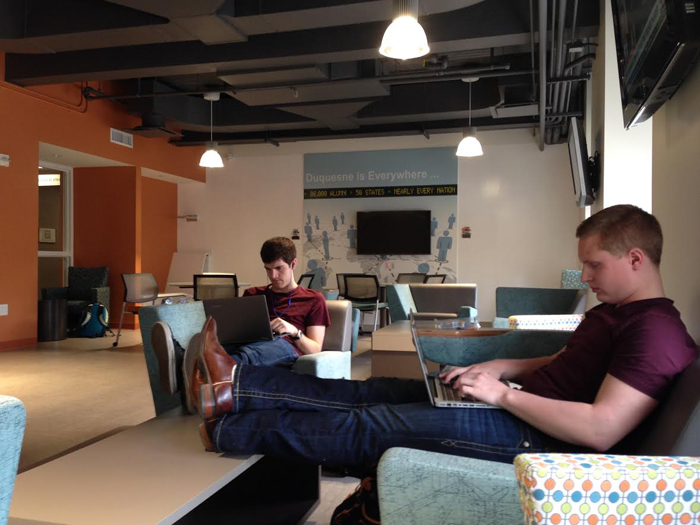

Kaye Burnet | Asst. News Editor
The Dean of the Palumbo Donahue School of Business announced a series of future innovations for the school during a formal dinner on April 9. The changes include dramatic renovations to Rockwell Hall and the addition of two new advisory councils for the school.
Dean McFarlin, business school dean since 2013, said the school is working with Duquesne’s Facilities Management Department and architects from the international design firm Stantec to develop a comprehensive plan for Rockwell’s facelift. According to McFarlin, the plan could take as long as a decade to implement fully, and changes will mostly take place in 13-week summer phases.
McFarlin said Rockwell needs to be adapted to fit the needs of a modern-day business school.
“We’re moving away from ‘Sit in a classroom while I yak at you for 15 weeks,’” McFarlin said. “Learning isn’t about information acquisition anymore.”
To adapt to modern learning and teaching methods, McFarlin wants Rockwell to include more “sandbox spaces,” or conference areas where professors and students can come together conference-style, instead of the traditional classroom.
McFarlin said that in addition to the issues of raising money and coordinating building schedules with class schedules, the Rockwell facelift will present technological challenges.
“You have to build in for obsolescence,” McFarlin said. He explained that any technology put in classrooms this year would be considered old in two or three years.
“That’s why you have to leave room for new technology to replace the old,” McFarlin said.
Executive Director of Facilities Management Rod Dobish said the plan should be ready by August. According to Dobish, the changes will focus on floors three through nine in Rockwell.
The alterations will be a continuation of renovations made during the last two years to floors three and five. Floor three now houses additional seating for students in its hallways and a high-tech classroom with multiple television screens and group-style seating. Changes to floor five resulted in an open lounge space with new seating, a high ceiling, and flat screen televisions.
Dobish said the first changes will happen to the Peter Mills Theater in the bottom of Rockwell, which will be converted into a lecture hall during the summer, before the rest of the plan is completed.
Both Dobish and McFarlin said modernizing the building’s heating and cooling system, as well as its fire prevention installations, is a priority.
“There’s a lot of infrastructure to bring up to code,” McFarlin said.
McFarlin hopes the newly formed Business Advisory Council and Investment Center Advisory Council will keep the school in tune with the modern business world. The BAC has 11 members and the ICAC has seven, all of whom are prominent business leaders.
The dean said the councils will create “a pipeline for internships and jobs” for business school students.
The ICAC members will focus on ways to improve the business school’s Investment Center, located on the sixth floor of Rockwell. The center gives students access to large sets of data that they can use to research events in the business world.
“Fifteen years ago, having an investment center was unique,” McFarlin said with a chuckle. “It ain’t anymore.”



